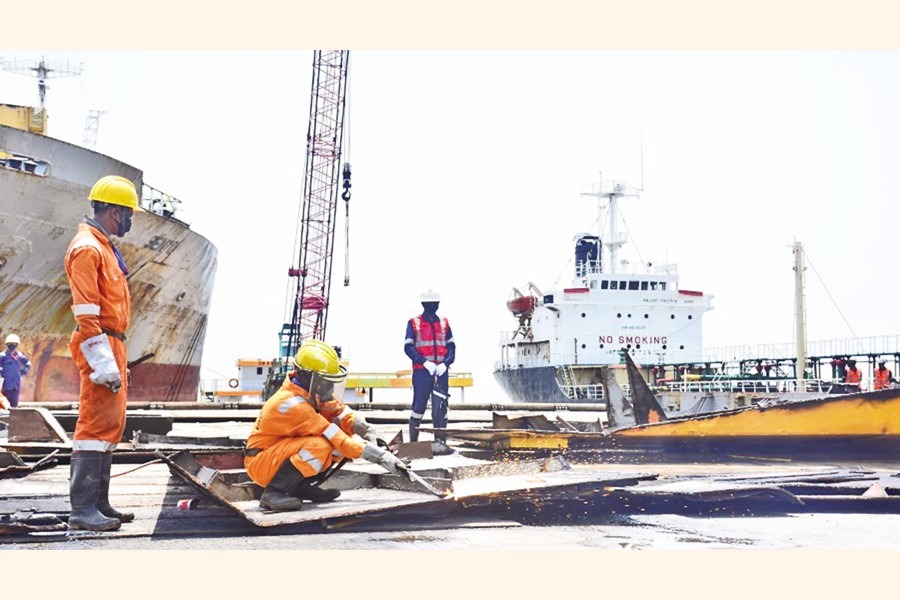
Published :
Updated :

There is no denying that Bangladesh's shipbreaking sector is now past its prime as it struggles on multiple fronts to keep itself sustainable. The headwinds it is facing have to do with regulatory and compliance issues as well as a slump in ship recycling business globally. Given the sector's notoriety as an environment polluter, a source of substances harmful to human health as well as ecology and its disregard for workers' safety, it is hardly surprising that the sector has long been in the crosshairs of the local and international rights groups and environmental lobbies. Classified Red by the Department of Environment (DoE) in 2007 and then reclassified back to Orange B in 2021, the sector needs to fast-track its efforts to meet the conditions of regulatory authorities concerned.
So, to remain in business, the ship recycling yards in Bangladesh have to go green as required by the Hong Kong Convention (HKC), which the country ratified in June 2023 and it (ratification) came into force on Jene 26, 2025 so that safe and environmentally sound ship recycling practices could be ensured. But due to procedural delays in getting the necessary clearances at home, thanks to the tardy bureaucracy, the country runs the risk of losing its competitive edge in the international shipbreaking market. Though the country's ship-breaking yards began their green transitioning since 2017 when one of the ship recycling yards got the required international certification, yet the process has remained rather slow, according to the Bangladesh Ship Breakers and Recyclers Association (BSBRA). That is why, so far only seven ship recycling yards could obtain Statement of Compliance (SoC) from HKC, says the NGO Shipbreaking Platform (NSP), an international body for greener and safer ship dismantling practices.
But unless, the shipbreaking yards get the necessary compliance certification from HKC, the local companies will not be able to import the scrap ships for recycling. Reports have it that local shipbreakers bought only 57 scrap ships between January and June of this year which is 36 per cent less than the number of end-of-life ships imported during the same period last year (2024) at 89. Such downturn is bad news not only for the local shipbreaking industry which once led the world with the highest number of scrap ship dismantled in 2021 at 254, it also means loss of livelihoods of those employed in this sector which according to an estimate numbered 40,000 workers and families dependent on them. The shipbreaking industry's decline is not a matter of highs and lows that happens in every type of business. On the contrary, it is a structural one, think some experts. Multiple global factors are also to blame for this including the Russia-Ukraine war that began in 2022 followed by the Red Sea crisis (starting in 2024) disrupting global shipping routes and supply chains.
All this has led to an emergency with the demand for additional shipping capacity. As a result, globally, the shipbreaking sector has fewer old ships earmarked for demolition. As expected, the global decline in the shipbreaking industry has threatened the viability of the domestic ship recycling sector, too. Some yards have reportedly shut down their operations. Under the prevailing circumstances, the government should expedite its work of issuing DASR (Document of Authorization to Conduct Ship Recycling (DASR), which is mandatory under HKC, to which Bangladesh is a party. Local industry insiders view the lack of DASR a barrier to their importing scrap hips for demolition. So, the faster the country's shipbreaking yards turn green, the better will be their prospect of growth and, again, become a thriving industry as before.


 For all latest news, follow The Financial Express Google News channel.
For all latest news, follow The Financial Express Google News channel.